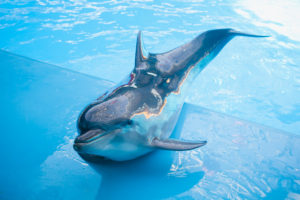Ric O’Barry: ‘Paesi Bassi, chiudete il delfinario!’
Ric O’Barry ha richiamato l’attenzione degli olandesi per diventare privo di delfinari. L’ex-allenatore di Flipper e rappresentante mondiale della tutela dei delfini, ha fatto questo gesto durante un dibattito con la Camera. O’Barry trova tenere i delfini in cattivita’ a svantaggio per gli animali e una maniera sbagliata di fornire formazione sui delfini.

Il protettore dei delfini Ric O’Barry era stato invitato a parlare sui delfini nella Camera il 8 di giugno dai membri della Camera Frank Wasserberg (Partito per gli Animali) e Rudmer Heerema (VVD). O’Barry lavoro’ coi delfini per vari anni per poi decidere di dedicare la sua vita alla liberazione e tutela di questi mammiferi intelligenti. Secondo lui i delfinari sono dei circhi mimetizzati che sono a svantaggio per il benessere degli animali e danno un messaggio sbagliato ai bambini. Gli viene insegnato che e’ accettabile tenere gli animali in cattivita’ e di dominarli.
O’Barry dice che la vita dell’uomo e dell’animale e’ tutto sul poter prendere le proprie decisioni. Questo e’ contrario alla vita di delfini in cattivita’ o piu’ precisamente in una vasca di cemento. In questa vasca i delfini non riescono ad avere il loro comportamento normale. O’Barry dice anche che i delfini in un delfinario non riescono bene a communicare tra di loro poiche’ i suoni del loro sonar riflette nella vasca di cemento. O’Barry chiede ai Paesi Bassi – ‘uno dei paesi piu’ progressivi nel mondo’ di dare un buon esempio al mondo e di chiudere il delfinario. Tutti gli abitanti dei Paesi Bassi possono contribuire non comprando biglietti per gli spettacoli nei delfinari. Il Partito per gli Animali supporta la posizione di O’Barry fortemente.
Flipper
Negli anni ’60 Ric O’Barry stesso ha cacciato quattro delfini selvatici per allenarli per la popolare trasmissione televisiva ‘Flipper’. Il contatto con questi animali sociali ed intelligenti ha cambiato le prospettive di O’Barry. Dagli anni ’70 si impegna per raggiungere piu’ persone possibile dandogli il messaggio sugli effetti negativi della cattaivita’ sui delfini.
Ric O’Barry has called on the Dutch Parliament to close the Dolphinarium in the Netherlands. The global figurehead of dolphin protection and former trainer of the famous dolphin Flipper made his appeal during a meeting of the Dutch Lower House. O’Barry believes dolphin captivity to be animal-unfriendly and he feels that it sends the wrong message to our children.

At the invitation of MPs Frank Wassenberg (Party for the Animals) and Rudmer Heerema (VVD), dolphin protector Ric O’Barry has addressed the Dutch Lower House on the subject of the dolphinarium on Wednesday 8 June. O’Barry, who had worked with dolphins for a few years before deciding to dedicate his life to the freeing and protecting of intelligent marine animals, claims that dolphinariums are disguised circuses that are bad for animal welfare and send the wrong message to our children: they are taught that the captivity and domination of animals is acceptable.
O’Barry argues that the lives of both humans and animals are about making one’s own decisions. This is at odds with the lives of dolphins in captivity, which are spent entirely inside a concrete container. In this container, dolphins are unable to express normal patterns of behaviour. O’Barry also states that communication is very difficult for dolphins in a dolphinarium, as the sound of their sonar reverberates in the concrete container. That is why O’Barry has called on the Netherlands – “one of the most progressive countries in the world” – to set an example for the world by closing the Dolphinarium. Everyone in the Netherlands can contribute by not buying a ticket to a dolphin show. The Party for the Animals strongly supports O’Barry’s appeal.
Flipper
In the sixties, Ric O’Barry caught five dolphins from the wild, and trained them for his popular TV show Flipper. However, his contact with these social and intelligent animals made him change his mind, and since the seventies, O’Barry has dedicated himself to reaching as many people as possible about the adverse effects of dolphin captivity.